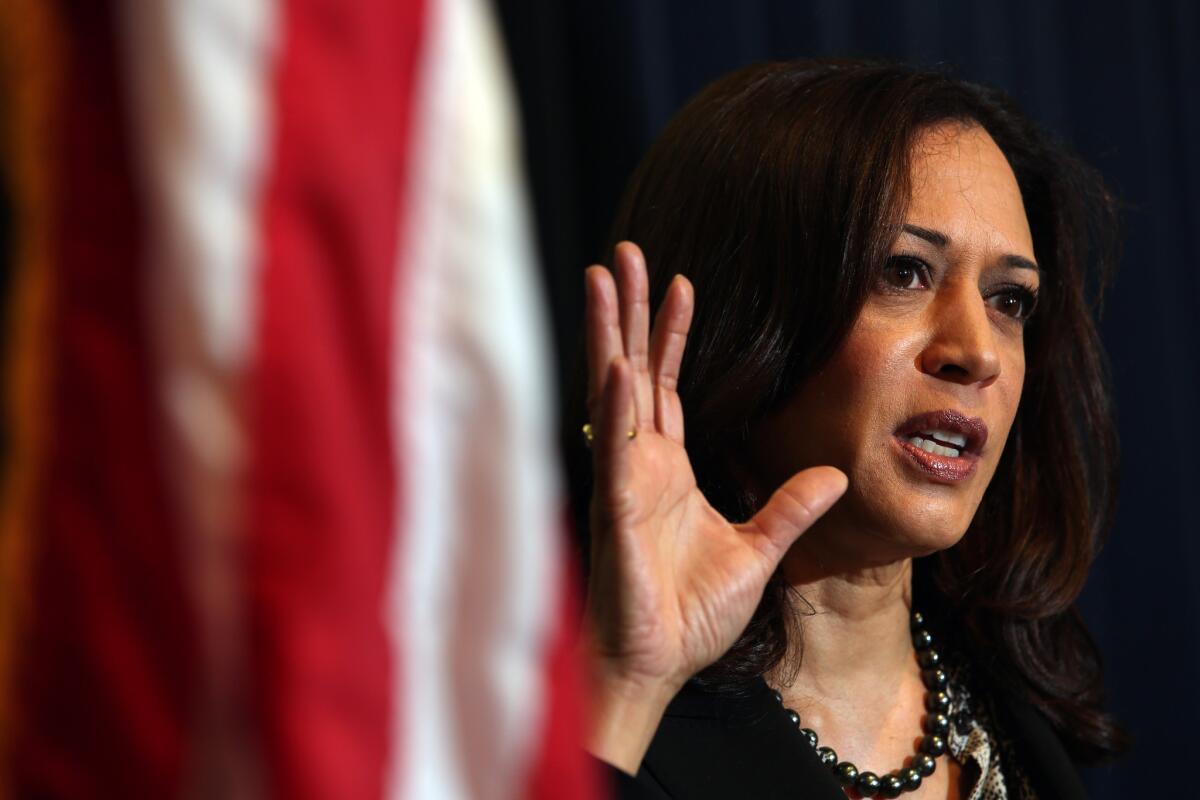Chase settles lawsuit over debt collection

California Atty. Gen. Kamala Harris, shown at a February news conference, reached an agreement with Chase, which had settled with 47 other states earlier this year.
- Share via
The nation’s biggest bank will pay $50 million to settle allegations that it used illegal and abusive debt-collection practices to squeeze money out of California credit card customers.
The deal settles a 2013 lawsuit brought against JPMorgan Chase by California Atty. Gen. Kamala Harris and follows a national settlement over similar allegations.
Harris said that from 2009 to 2013 Chase miscalculated the amounts that consumers owed, sold debts to collectors even if they were settled and filed more than 125,000 collections lawsuits against Californians using “robo-signed” documents — ones that weren’t reviewed before being submitted to the court.
The bank also was accused of sending threatening letters to consumers and improperly seeking default judgments against military members on active duty, in violation of state and federal laws.
The settlement, which was announced Monday but still needs court approval, calls for Chase to pay $50 million in penalties to the state.
“Abusive and illegal debt-collection practices will not be tolerated in California,” Harris said in a statement. “This settlement provides real relief to tens of thousands of Californians, including service members, and prevents JPMorgan Chase from continuing these deceptive and illegal debt-collection practices.”
In addition to the state penalties, Chase will pay $50 million in restitution to customers who were the victims of its debt-collection practices, something the bank agreed to do in a larger settlement it reached this summer with 47 states and the federal Consumer Financial Protection Bureau. About $10 million of that is expected to go to customers in California.
Chase also has agreed, both in the national and California settlements, to a list of conditions governing how it can collect debt or sell consumer debts to outside collection companies.
For instance, the bank agreed to make sure that its contracts with debt buyers — firms that purchase consumers’ defaulted credit card debt, then try to collect that debt — prevent them from going after consumers unless they have all the information needed to prove their debts exist.
Ira Rheingold, executive director of the National Assn. of Consumer Advocates, said banks often provide debt buyers with incomplete or inaccurate information, but they are often still able to collect because consumers either do not know their rights or are not able to fight in court.
The settlement announced Monday, and the national settlement reached over the summer, should be a sign to banks that the kind of lapses alleged in the California case are likely to face further scrutiny from regulators, Rheingold said.
“I think what you’re seeing with these decisions is that banks had better get their act together. Rules are coming and that kind of behavior won’t be tolerated,” he said. “Business as usual in terms of debt collection has to stop.”
Chase spokesman Paul Hartwick said the bank has been working to resolve debt-collection problems over the last several years. Since 2011, he said, the bank has not filed any credit card debt suits against customers, and it has dismissed lawsuits that were filed improperly.
“We’ve been working on this for the last few years and have made a great deal of progress,” Hartwick said.
In both the California and national settlements, Chase neither admitted nor denied wrongdoing, and the bank has said the cases target practices that the bank stopped years ago.
Still, the debt-collection settlements are adding up to a pricey payout for the bank. Between customer restitution and penalties paid to California, other states, the Consumer Financial Protection Bureau and the federal Office of the Comptroller of the Currency, Chase is out more than $250 million so far.
james.koren@latimes.com
More to Read
Inside the business of entertainment
The Wide Shot brings you news, analysis and insights on everything from streaming wars to production — and what it all means for the future.
You may occasionally receive promotional content from the Los Angeles Times.











